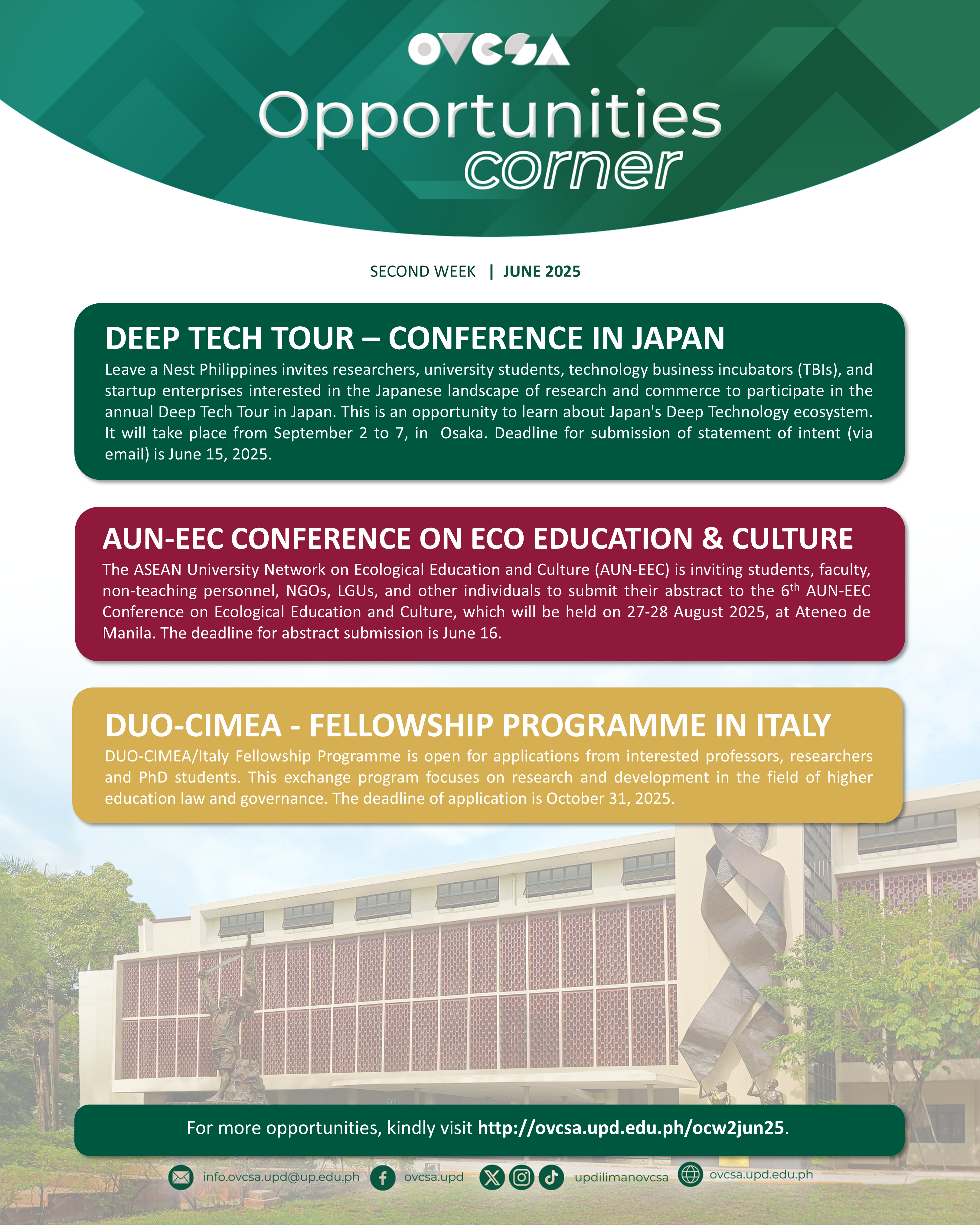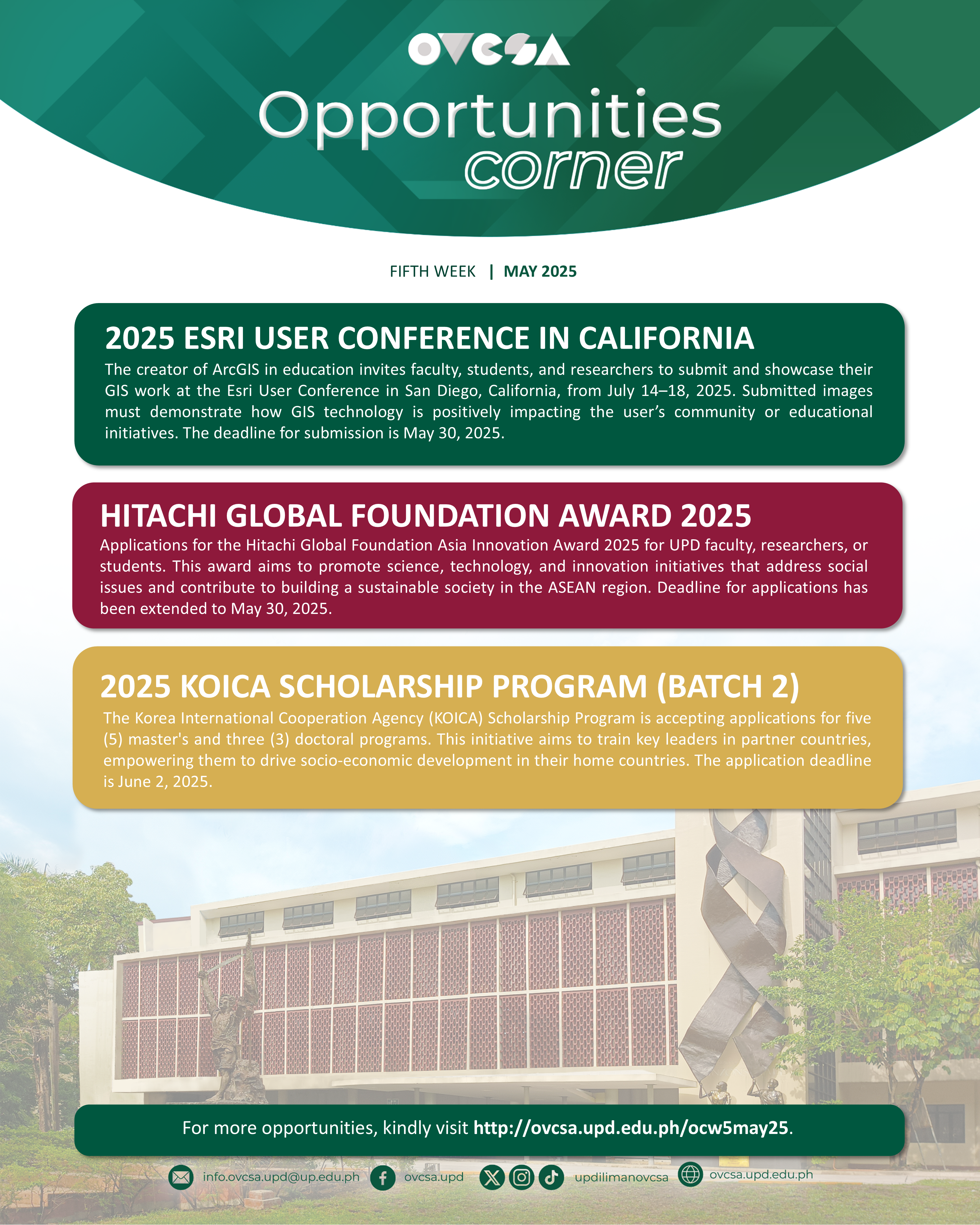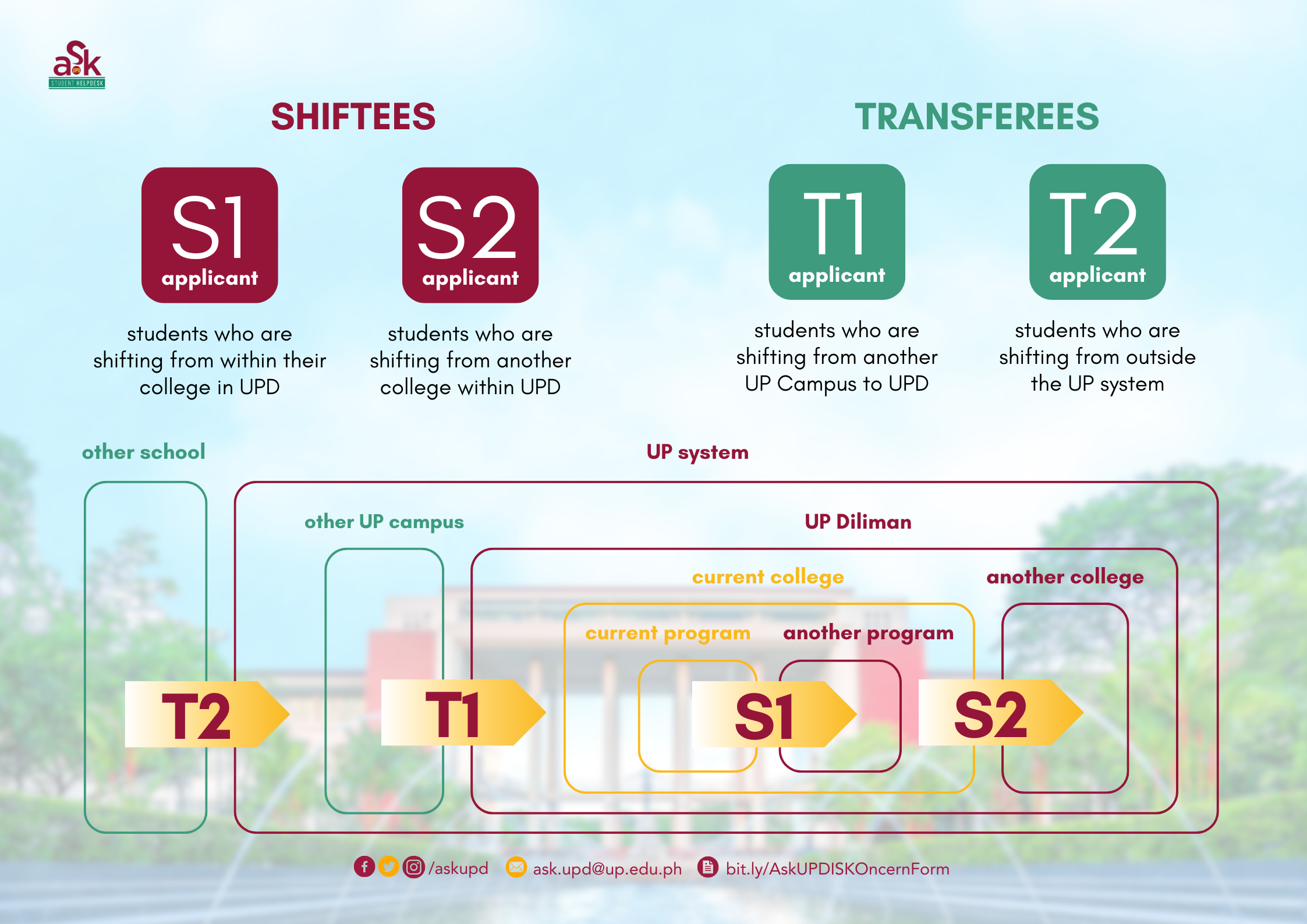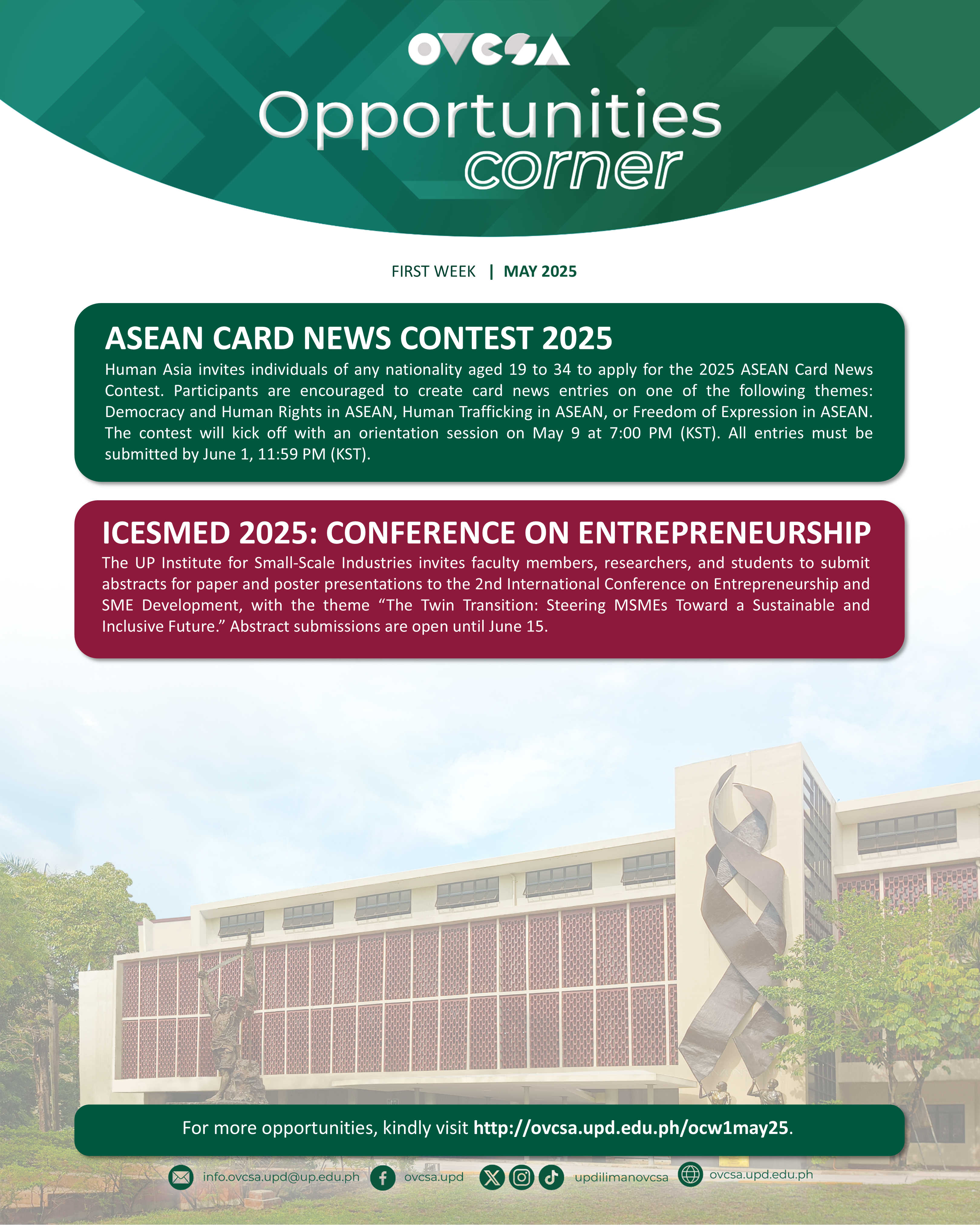The Surviving Long Distance/Remote Learning webinar series was a series of online talks on remote learning organized for students by the UP Diliman Office of the Vice Chancellor for Student Affairs (OVCSA) in February 2021. This was in response to the perceived gap in the onboarding of students during the 2020 transition to remote learning necessitated by the closure of campuses because of the COVID-19 pandemic.
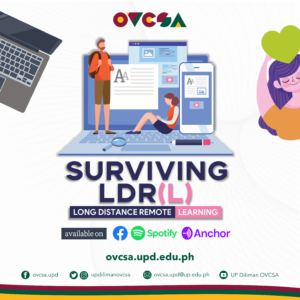
Nine (9) UP experts presented their knowledge on four fundamental skills for remote learning that would enable students to better cope with the difficult setup of having to study away from campus during these uncertain times: (1) coping with remote learning, (2) managing mental health, (3) improving communication skills, and (4) refining information and digital literacy skills.
Students from the four academic clusters (Arts and Letters, Management and Economics, Science and Technology, Social Sciences and Law) also shared their best practices in study habits and study-life balance from their first semester of remote learning during the first semester of AY 2020-2021. They did not only give practical tips and techniques but also articulated the need to provide support to all students through this endeavor, true to the spirit of #WalangIwanan (no student left behind).
Those who missed the live viewing of these webinars can still watch the recorded videos in this Surviving LDR(L) collection, or listen to and download the audio files here. Otherwise, below is a quick guide on the contents of each installment.
I Deserve An Explanation! I Deserve An Acceptable Reason!: Coping with Remote Learning
(01 February 2021, 3-5 pm)
The first installment aimed to set the grounds on the basics of navigating a remote learning environment and how this is different from a face-to-face setup, both on the part of the educators and the learners. Prof. Grace S. Koo (College of Education), highlighted in her presentation a 7-point guide to “Optimizing the Benefits of Remote Learning”: simplicity, structure, self-regulation, strategies, support, self-care, and sleep.
Assoc. Prof. Jose Antonio Clemente (College of Social Sciences and Philosophy), current Director of the Office for the Advancement of Teaching (OAT), followed up by delving into the results of the learning assessment done by the University during the first semester, and provided useful tips for coping with a changed learning environment: do not run away from distress, reflect on experiences, there are things beyond control, appreciate the relevance of one’s choice of discipline, practice reading and listening, and do the changes you can do to improve your environment. It is during these times that we question an iskolar ng bayan’s “Honor and Adequacy?.”
Listen to the lectures here:
| PROGRAM | TIME STAMP | |
| AUDIO FILES | FACEBOOK LIVE VIDEO | |
| Opening Remarks
Asst. Prof. Crizel Sicat-de Laza |
03:00 | 10:54 |
| Optimizing the Benefits of Remote Learning
Prof. Grace Koo |
09:16 | 17:10 |
| Honor and Adequacy?:
Navigating Changed Learning Spaces Assoc. Prof. Jose Antonio Clemente |
01:05:20 | 01:13:14 |
| Best Practices of Student Reactor
Robin Jacob Traballo (CSSP) |
01:53:14 | 02:01:08 |
Am I Not Enough? May Kulang Ba Sa Akin? May Mali Ba Sa Akin?: Managing Your Mental Health
(08 February 2021, 3-5 pm)
The spike in student mental health problems and challenges brought about by the pandemic has also necessitated a special lecture on managing mental health. During this session, Dr. Mary Ann Gina Valderrama (Office of Counseling and Guidance), and Dr. Gieselle Patricia Principe (UPD PsycServ) shared useful foreign and local research on the topic and similarly referenced from their firsthand experiences with student clients.
Dr. Valderrama used bodies of water as metaphors for the challenges we face and our strategies of coping with them in her presentation “reinvigorated Resilience in Education.” She listed the causes of anxiety that students face such as technological challenges or panicgogy, financial problems, family issues, delays in future plans, fear of missing out, burnout, and hopelessness. She then suggested ways on how to be more resilient, in particular on how to manage time. She ended her lecture by reminding the participants to take social media breaks from time to time, as what we see in timelines or feeds heavily affect our mental health.
As a Psychosocial Support Specialist from UPD PsycServ, Dr. Principe shared their institution’s statistical data and noted the increase in their student clients during the pandemic. Comparing their data and other recent studies, it was revealed that students’ main areas of concern are health, concentration, sleep, lack of social instruction, and academic performance. She addressed these by talking about the mind-body connection and how to respond to certain stimuli and handle emotions well. Her presentation “I Can Be Changed By What Happens To Me” is full of practical learnings perfect for ending the mental health webinar session.
Listen to the lectures here:
| PROGRAM | TIME STAMP | |
| AUDIO FILES | FACEBOOK LIVE VIDEO | |
| Opening Remarks
Asst. Prof. Joel Javiniar |
02:45 | 06:15 |
| reinvigorated Resilience in Digital Education
Dr. Mary Ann Gina Valderrama |
07:17 | 10:47 |
| I Can Be Changed by What Happens To Me: Lessons Learned
Dr. Gieselle Patricia Principe |
53:44 | 57:14 |
| Best Practices of Student Reactor
Julia Clarisse De Leon (NCPAG) |
02:10:46 | 02:14:16 |
Pero Bakit Parang Galit Ka? Pero Bakit Parang Kasalanan Ko?: Communication Skills
(15 February 2021, 4:30-7 pm)
The third set of resource speakers conveyed tips on communication skills for effective remote learning, effectively using pop culture references such as memes and famous lines to give the session a lively and engaging effectiveness. Asst. Prof. Jon Paul Maligalig (College of Education) started the session by looking at different models of communication and how the 4Cs of 21st century learning (communication, collaboration, critical thinking, and creativity) should be well integrated in a remote learning system. He then gave practical advice, both for educators and students, on how to make remote learning setup work just like how to make long distance relationships work, which is the central theme of his lecture “LDR sa Panahon ng Pandemya.”
Asst. Prof. Gabriela Lee (College of Arts and Letters) built on the earlier presentation on the basics of communication, and emphasized the importance of always speaking up to avoid misunderstandings, as explained in the title of her presentation: “None of Us are Telepathic.” To be understood and to understand others, we must communicate clearly and safely especially during this time that almost everything is done online and is prone to misinterpretation in the absence of body language and other extralingual cues to provide context. She also gave advice on online etiquette such as in email, video calls, collaborative apps and sites, and on how to present yourself well.
Because UP students are not unfamiliar with online political engagements, dealing with online trolls, and managing the mess of even one’s regular social media accounts, Asst. Prof. Charles Erize Ladia (College of Arts and Letters) reviewed on “Kaya Ba Today?” on how we can be more responsible for our online engagements and how to assess what battles are worth fighting in cyberspace. Drawing from his own experiences of online attacks, he pointed out that the key to online engagements are to be yourself, to be strategic, to be mindful, to be assertive and not aggressive, to be responsible, to be truthful, and to be smart.
Listen to the lectures here:
| PROGRAM | TIME STAMP | |
| AUDIO FILES | FACEBOOK LIVE VIDEO | |
| Opening Remarks
Asst. Prof. Dan Anthony Dorado |
05:34 | |
| LDR sa Panahon ng Pandemya:
Communication in Learning Done Remotely Asst. Prof. Jon Paul Maligalig |
05:00 | 07:50 |
| None of Us are Telepathic: Communicating Clearly in the Time of Remote Learning
Asst. Prof. Gabriela Lee |
39:04 | 41:54 |
| Kaya ba today? Practicing Responsible Online Political Engagement in Challenging Times
Asst. Prof. Charles Erize Ladia |
01:15:07 | 01:17:57 |
| Best Practices of Student Reactor
John Ray Dionisio (CHE) |
02:13:55 | 02:16:45 |
Akala Mo Lang Wala…Pero Meron! Meron! Meron!: Information and Digital Literacy
(22 February 2021, 3-5 pm)
The last installment of the webinar series discussed how to improve one’s information and digital literacy skills as one of the necessary proficiencies in an online learning environment. Asst. Prof. Yhna Therese Santos (School of Library and Information Studies) began her presentation “Information Literacy and Remote Learning” with defining what information literacy is, which is the ability to look for credible and authoritative sources and data and use it to make informed decisions. The five core skills for information literacy are identifying one’s needs, searching, evaluating, applying, and acknowledging information. Once able to familiarize with these, one can apply these in everyday life, one’s studies and scholarship, and even one’s daily engagements with information.
Asst. Prof. Elenita Que (College of Education) then delved into digital literacy, which has almost the same meaning as information literacy but with more focus on online communication technologies and communities. She shared several skills that a digitally literate person possesses, including being able to create content, being able to find and consume digital information, and being able to communicate and share these information. Having these skills will surely be able to help someone “Defy the Distance” during the remote learning period. She also pointed out that each one has a digital identity and leaves a digital footprint so one must take extra measures in securing personal information and to think critically in every post and action done online.
Listen to the lectures here:
| PROGRAM | TIME STAMP | |
| AUDIO FILES | FACEBOOK LIVE VIDEO | |
| Opening Remarks
VCSA Asst. Prof. Louise Jashil Sonido |
03:00 | 12:45 |
| Information Literacy and Remote Learning
Asst. Prof. Yhna Therese Santos |
08:10 | 17:55 |
| Defy the Distance!: A look at the role of online learning communities in overcoming the challenges of geographically-challenged learning
Asst. Prof. Elenita Que |
48:00 | 57:45 |
| Best Practices of Student Reactor
Bea Camille Cortez (College of Fine Arts) |
01:57:30 | 02:07:15 |
With hundreds of official registrants and thousands of live views, these free webinars were able to reach not only UP Diliman students, but also students, faculty, and staff of UP system and other universities and schools.
True to the spirit of involving the participation of students in activating our online learning spaces, students from Library and Information Science (LIS), Ms. Ma. Nicole Tacuboy and Mr. Einor John Godfrey Abad served as hosts to give wit and zest to the discussions and deliver remarkably convincing performances of the webinar titles based on famous “hugot” movie lines.
The organizing committee was headed by the Vice Chancellor for Student Affairs Louise Jashil Sonido, with Diliman Learning Resource Center (DLRC) Director Dan Anthony Dorado, Office of Counseling and Guidance (OCG) Director Dr. Joel Javiniar, Office of Student Projects and Activities (OSPA) Coordinator Crizel Sicat-de Laza, and Office for the Advancement of Teaching (OAT) Director Dr. Jose Antonio Clemente. This event was also done in cooperation with the Interactive Learning Center (ILC) Diliman.





